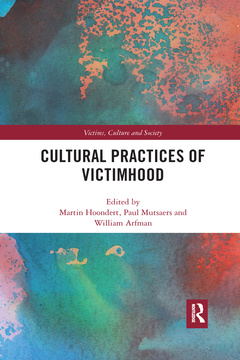Description
Cultural Practices of Victimhood
Victims, Culture and Society Series
Coordinators: Hoondert Martin, Mutsaers Paul, Arfman William
Language: English
Subjects for Cultural Practices of Victimhood:
Keywords
Transitional Justice; Cultural Criminology; Young Man; Crime and Media; Vice Versa; Cultural Victimology; Boat Refugees; Victimology; Positivist Victimological; Crime Media Culture; Paul Mutsaers; Black Lives Matter Activists; William Arfman; Ritual Repertoire; Antony Pemberton; Ritual Criticism; Paul Post; Restorative Justice; David Clarke; Freedom Memorial; Lieke Wijnia; European Migration Crisis; Gema Varona; Srebrenica Genocide; Odile Heynders; Post-war Bosnia Herzegovina; Jan Blommaert; Checkpoint Charlie Museum; Sjaak Kroon; Bosnian Serbs; Memorial Museum; Anti-police Protests; Isla Vista; Translation Note; De Volkskrant; Basque Country; Border Deaths; SED’s Rule; BLM
Publication date: 03-2021
· 15.6x23.4 cm · Paperback
Publication date: 07-2018
· 15.6x23.4 cm · Hardback
Description
/li>Contents
/li>Readership
/li>Biography
/li>
Cultural Practices of Victimhood aims to set the agenda for a cultural study of victimhood. Words such as ?victim? and ?victimhood? represent shifting cultural signifiers, their meaning depending on the cultural context of their usage. Using case studies and through a practice-based approach, questions are asked about how victimhood is defined and constructed, whether in the ritual commemoration of refugees on Lampedusa, the artistic practices of an Aboriginal artist such as Richard Bell, or the media practices associated with police violence.
Consisting of contributions by cultural studies experts with an interest in victim studies, this book seeks a double readership. On the one hand, it intends to break new ground with regards to a ?cultural turn? in the field of criminology, in particular victimology. On the other hand, it also seeks to open up discussions about a ?victimological turn? in culture studies. The volume invites scholars and advanced students active in both domains to reflect on victimhood in cultural practices.
Introduction: Cultural practices of victimhood, Martin Hoondert, Paul Mutsaers and William Arfman,Part I: Ritual Practices. 1. Srebrenica: Conflict and ritual complexities, Martin Hoondert, 2. A monument for boat refugees: Ritual and the art of liminality, William Arfman, 3. Refugee rituals: Exploring ritual repertoire of victimhood, Paul Post,Part II: Artistic Practices. 4. Representing the experience of victims at the Berlin Wall Memorial Museum, David Clarke, 5. Victimhood in reverse: Art in the age of apology, Lieke Wijnia, 6. Basque Country competing memories at the local, regional and state levels: Promoting public artistic events versus public institutional policies, Gema Varona, 7. Who speaks for the victim? Experiences of migrants and refugees in Jenny Erpenbeck’s novel Go, went, gone and Mikhail Shishkin’s Maidenhair, Odile Heynders,Part III: Media Practices. 8. #BlackLivesMatter: Understanding anti-police protest as a cultural practice, Paul Mutsaers, 9. Online-offline modes of identity and community: Elliot Rodger’s twisted world of masculine victimhood, Jan Blommaert, 10. The Cologne translation note: Victims and perpetrators, Sjaak Kroon, Epilogue: Imagining cultural victimology, Antony Pemberton
Martin Hoondert studied musicology and theology and is specialized in music and rituals. Since 2007 he has been(associate) professor of Music, Religion and Ritual at the Department of Culture Studies of Tilburg University. His research focuses on ‘music and death’ and ‘practices of memorialization’.
Paul Mutsaers studied cultural anthropology at Utrecht University and works as a police anthropologist for the Department of Culture Studies, Tilburg University, where he is employed as a postdoctoral researcher. He has previously worked at the Police Academy of the Netherlands, where he carried out his PhD research on police discrimination.
William Arfman has a background in the archaeology and anthropology of Central America, as well as the comparative study of religion. Currently, he is a postdoctoral associate and lecturer in the field of ritual studies at Tilburg University. Favouring an interdisciplinary approach, his main research interests are late modern ritual dynamics, ritual innovation and traditionality, ritual and (community) art, and ritual commemoration.
These books may interest you

Handbook of Victims and Victimology 220.72 €



